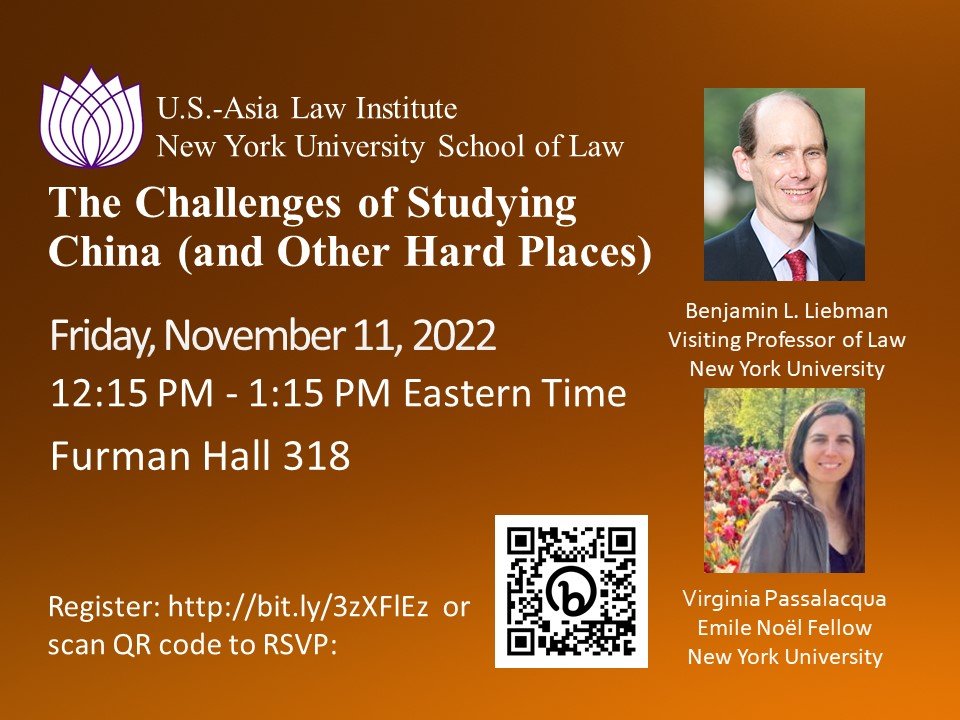The Challenges of Studying China (and Other Hard Places)
Friday, November 11, 2022
12:15 PM - 1:15 PM Eastern Time
Furman Hall 318
Register Here
About the event
COVID restrictions combined with a deterioration in China’s relations with the West have made scholarly contact between China and Western scholars and even remote research far more difficult than in the past. What strategies can we use to study recent developments in China that are no longer easily accessible? What are some of the ethical and safety considerations? Visiting Professor Benjamin Liebman will discuss his ongoing research using public databases in China. He also will discuss other types of challenges that scholars of China increasingly face. He will be joined by Emile Noel Fellow Virginia Passalacqua, who will offer thoughts on whether the difficulties (and opportunities) scholars face in studying China may be mirrored elsewhere in the world.
About the speaker
Benjamin L. Liebman
Benjamin L. Liebman is the Robert L. Lieff professor of law and director of the Hong Yen Chang Center for Chinese Legal Studies at Columbia Law School. Widely known as a preeminent scholar of contemporary Chinese law, Liebman studies Chinese court judgments, the roles of artificial intelligence and big data in the Chinese legal system, Chinese tort law, Chinese criminal procedure, and the evolution of China’s courts. His research has covered diverse topics in Chinese law over the years, ranging from leniency in criminal law to medical dispute resolution, securities markets, and the role of law in authoritarian countries. In 2015, Liebman published Regulating the Visible Hand: The Institutional Implications of Chinese State Capitalism (Oxford University Press, with Curtis J. Milhaupt), which explores how extensive state intervention and participation drives China’s evolving economy—a critical contribution to the discourse surrounding China’s recent economic transformations. Professor Liebman also serves as the director of the Parker School of Foreign and Comparative Law. Prior to joining Columbia Law School’s faculty in 2002, Liebman was an associate in the London and Beijing offices of Sullivan & Cromwell. He also previously served as a law clerk to Justice David Souter and Judge Sandra Lynch of the 1st Circuit.
About the discussant
Virginia Passalacqua
Virginia Passalacqua is an expert in EU law, migration, and legal mobilization, which she investigates from a law and society perspective. Virginia holds a degree in law (cum laude) from the University of Bologna and a Ph.D. in EU law from the European University Institute, where she worked under the supervision of Professor Bruno de Witte. Her dissertation, Legal mobilization and the judicial construction of EU migration law, was awarded the Mauro Cappelletti Prize for the Best EUI Thesis in Comparative Law and her paper, “Altruism, Euro-Expertise and Open EU Legal Opportunity Structure: Empirical Insights on Legal Mobilization Before the CJEU in the Migration Field” was awarded the Ius Commune Prize 2020. Virginia’s work features in European and American journals such as Common Market Law Review, European Constitutional Law Review, and Law and Development Review. Virginia has recently joined the University of Turin where she works as an assistant professor in EU law. Previously she was a postdoctoral fellow at Utrecht University and at Collegio Carlo Alberto, and an Academic Fellow at Bocconi University. She held visiting positions at the London School of Economics and at Oxford University. As an Emile Noël Fellow, Virginia will work on her book on legal mobilization for migrant rights, where she addresses the question of why civil society actors engage in EU litigation for migrant rights in some countries but not in others.


